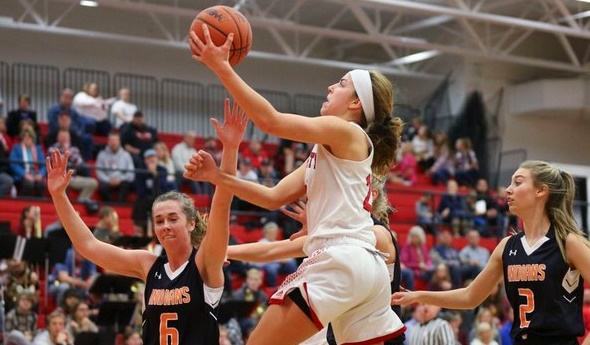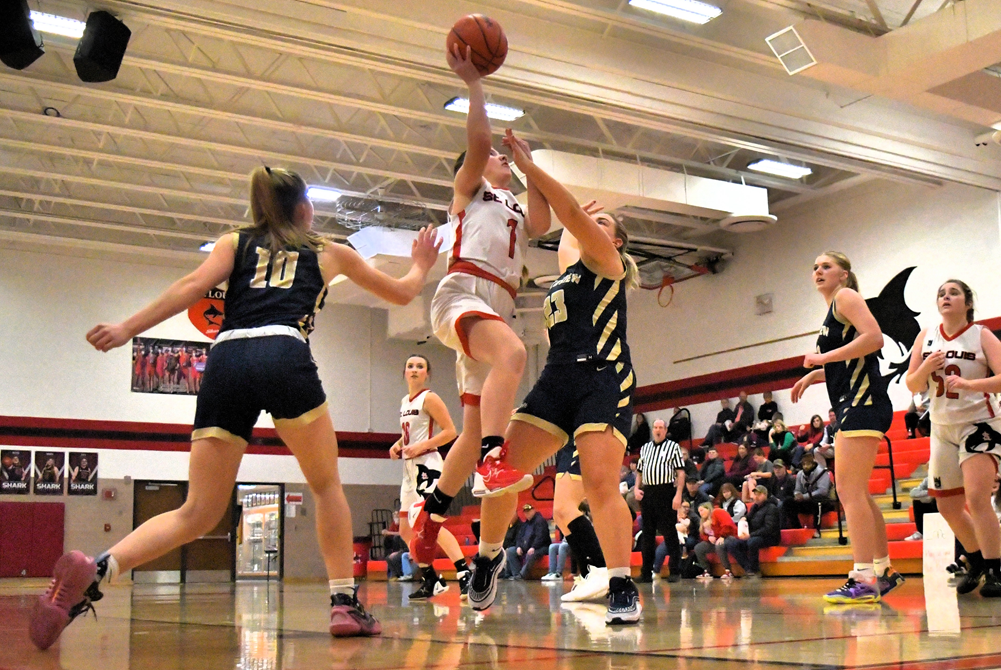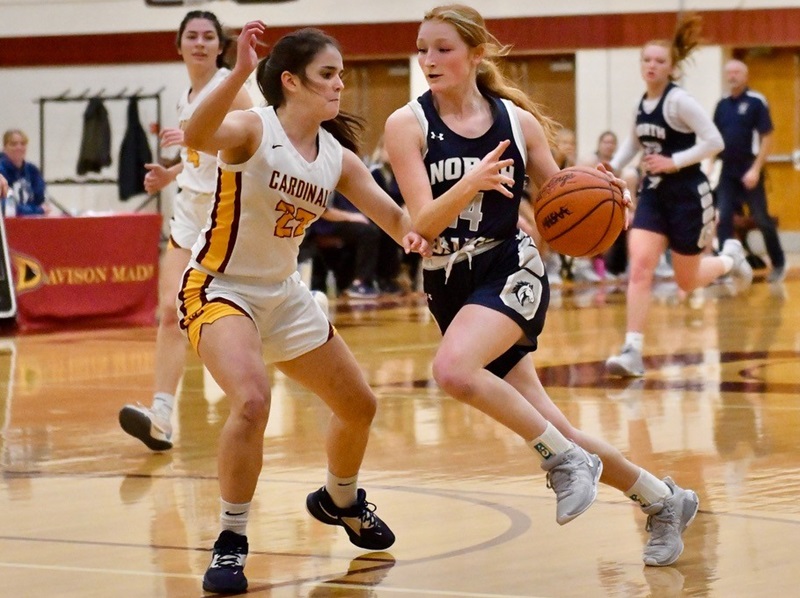
Bowers' Balance Paying Big for Kent City
December 20, 2018
By Dean Holzwarth
Special for Second Half
KENT CITY – Kenzie Bowers’ mother made sure her daughter wasn’t going to grow up to become just a scorer.
 An extra incentive did just the trick.
An extra incentive did just the trick.
“When I was younger my mom would record my games, and she would give me a dollar for every five or 10 points, but then she would also give me a dollar for every assist, too, because she didn’t want me to go out there and think that I was just going to score,” the Kent City standout sophomore said. “That was my way of thinking I was going to score, but I’m not going to be selfish with the ball because I wanted money both ways.”
Bowers, a 5-foot-10 guard, is still doing her share of scoring and distributing, and she’s picking up where she left off after a sensational freshman season.
In her debut campaign on the varsity, Bowers averaged 19.4 points and 8.4 rebounds per game while also leading her team in assists and steals en route to being named to the Class C all-state first team.
Bowers also helped spark Kent City’s historic postseason run to the Class C Quarterfinals.
“I’ve talked to Coach since seventh grade, and he told me if I kept working hard then he would have a spot for me on the varsity,” Bowers said. “He wanted me to be a leader, and I knew I was going to have to be a leader. I was ready for it, and I expected it.”
Kent City girls basketball coach Scott Carlson has known Bowers since first grade and helped coach her at every level leading up to high school.
He knew early on that she had a bright future ahead.
“By third grade you knew she was going to be a ball player because she was playing with our fifth and sixth-grade travel players at that point,” Carlson said. “She could handle the ball, and she loved the game. She was a baller from the word go.”
Bowers’ passion for the game developed from watching her two older brothers, and she started playing with older girls when she was in third grade.
 “I was the only third-grader, and I think it was definitely good to have that experience going into my fourth and fifth grade years when I was playing against girls my own age,” Bowers said. “You could tell I had played recently, and I was the second or third tallest girl on my team, but I was very skinny.”
“I was the only third-grader, and I think it was definitely good to have that experience going into my fourth and fifth grade years when I was playing against girls my own age,” Bowers said. “You could tell I had played recently, and I was the second or third tallest girl on my team, but I was very skinny.”
Bowers’ overall skill set quickly progressed. She attended multiple basketball camps and started playing AAU.
As middle school began, college coaches became aware of Bowers’ rare abilities.
“Seventh grade was the first time someone told me that college coaches were watching me and they thought I was pretty good,” Bowers said. “I was like, ‘College coaches are watching me?’ It was definitely surreal.”
A highlight of Bowers’ first high school season was a 37-point performance in a Regional Semifinal win over Beaverton.
Kent City went on to win its first Regional title in 29 years before losing to Pewamo-Westphalia in the Quarterfinals.
“She certainly surpassed what I expected of her as a freshman, but it didn’t surprise me in how hard she works,” Carlson said. “She’s very athletic, and she’s a quick study. If you show her something once she gets it quick, as quickly as anyone I’ve ever seen, and she’ll work on it until she perfects it.”
Bowers already has received several scholarship offers from Division I college programs, including Central Michigan, Western Michigan, Illinois State, Davidson and Oakland.
“It’s been really cool knowing I can go play college basketball at the next level,” Bowers said. “It makes me feel blessed and happy because I know I don’t have to spend all that money and I get to do something I love.”
Kent City is 4-1 this winter with its lone loss coming to Detroit Martin Luther King, 40-39.
Bowers is one of eight returning players from last season’s 22-4 squad.
“We didn’t lose anybody, so we know we are going to be a good team,” Bowers said. “We’re working to get better and make it further this season.”
 Dean Holzwarth covered primarily high school sports for the Grand Rapids Press and MLive for 16 years and more recently served as sports editor of the Ionia Sentinel and as a sports photojournalist for WZZM. Contact him at [email protected] with story ideas for Allegan, Kent and Ottawa counties.
Dean Holzwarth covered primarily high school sports for the Grand Rapids Press and MLive for 16 years and more recently served as sports editor of the Ionia Sentinel and as a sports photojournalist for WZZM. Contact him at [email protected] with story ideas for Allegan, Kent and Ottawa counties.
PHOTOS: (Top) Kent City’s Kenzie Bowers drives to the basket against White Cloud during a Dec. 7 win. (Middle) Bowers works to get past a Detroit Martin Luther King defender during their Dec. 8 game at Okemos. (Photos courtesy of the Bowers family.)

Breslin Bound: 2023-24 Girls Report Week 2
By
Geoff Kimmerly
MHSAA.com senior editor
December 18, 2023
As holiday breaks bring some rest from school and work, Michigan girls basketball teams are smashing the pedal to the floor right into the new year.
In addition to 26 multi-day tournaments and one-day showcases, many contenders have lined up matchups with other championship hopefuls. Among those: Rockford, Frankenmuth and Goodrich all reached last season’s Semifinals or Finals and are playing two games over the next three weeks against opponents that also finished last season at the Breslin Center.
Picking just five matchups to highlight until our next report Jan. 8 was pretty much futile. But we’ve selected a few noted below, along with our regular reports on teams that caught our attention over the last week.
“Breslin Bound” is powered by MI Student Aid and based on results and schedules posted for each school at MHSAA.com.
Week in Review
The countdown of last week’s five most intriguing results:
1. West Bloomfield 67, Salem 27 In a rematch of a Division 1 Semifinal from last season, West Bloomfield opened in a big way as part of the Kensington Lakes Activities Association/Oakland Activities Association Challenge.
2. Grass Lake 50, Tecumseh 40 The Division 3 Warriors (4-1) avenged last season’s 78-49 loss to Division 2 Tecumseh (2-2).
3. Detroit Edison 62, Detroit Country Day 53 These two Division 2 contenders met at the Best of Michigan Holiday Classic, with Edison moving to 2-0 by handing Country Day (4-1) its only defeat.
4. Sault Ste. Marie 50, St. Ignace 34 This Straits Area Conference matchup is arguably the best in the Upper Peninsula, and the reigning league champion Blue Devils (3-1) ran their winning streak over the Saints (3-1) to three.
5. Williamston 45, Haslett 43 Last season’s Capital Area Activities Conference Red runner-up Hornets (2-2) earned an early edge on reigning champion Haslett (2-3), which has three defeats by a combined nine points after going 22-2 last winter.

Watch List
With an eye toward March, here are two teams in each division making sparks:
DIVISION 1
Grand Rapids Kenowa Hills (4-0) Kenowa Hills jumped from 10-12 in 2021-22 to 16-9 last season, and is continuing to build. A 50-48 win over Kent City on Dec. 8 was an immediate attention grabber, and that had followed a 15-point win over Grandville Calvin Christian after the Knights had fallen to Calvin by 12 last winter.
Macomb Dakota (4-0) The Cougars have won all of their games by double digits, with their last two victories also the lone losses this season for Utica Ford and Dearborn. Dakota lost to Ford by 18 and six points last season on the way to finishing 14-11 overall.
DIVISION 2
Alma (4-0) The Panthers broke a string of three sub-.500 seasons in going 13-10 last winter and gave a hint of what they could do with a late two-point win over Saginaw Swan Valley after losing to the Vikings by 30 a month earlier. This season’s start has included a 10-point win over Swan Valley, and last week Alma handed the only losses so far to Gaylord and Bay City John Glenn.
Livonia Clarenceville (4-0) The Trojans have won a combined 29 games over the last two seasons, finishing third two years ago and tying for second last winter in the Michigan Independent Athletic Conference Red. After three double-digit wins to start this season’s campaign, Clarenceville may have earned its most notable in downing Bloomfield Hills Cranbrook Kingswood 39-37 on Friday – the Cranes’ lone loss.
DIVISION 3
Elk Rapids (4-0) The Elks entered this winter a combined 55-9 over the last three seasons including 21-4 a season ago. Opening with wins over a pair of Big North Conference opponents, Petoskey and Alpena, was solid, but perhaps bested last week with a 49-39 win over reigning Division 4 champion Maple City Glen Lake and 32-22 victory over Traverse City St. Francis – which also won 21 games last season and finished one ahead of Elk Rapids to take the Lake Michigan Conference title.
Ovid-Elsie (5-0) The Marauders ran their Mid-Michigan Activities Conference winning streak to 34 games with Friday’s 53-46 victory over New Lothrop, having claimed the last two league titles and also topping 20 wins overall the last two winters. Ovid-Elsie’s wins over the Hornets and Otisville LakeVille Memorial this season remain those teams’ only defeats.
DIVISION 4
Alcona (4-0) The Tigers bounced back from a 2-3 start last season to finish 15-7 and share the North Star League Big Dipper title with Oscoda and Rogers City, and they’ve already avenged two of those early losses with wins the last two weeks over Hillman and Posen. Alcona also handed Tawas its only defeat so far, 44-33 on Friday.
Ishpeming (3-0) Thursday’s 54-28 win over Calumet was Ishpeming’s first over the Copper Kings since December 2018 and came after the Hematites extended their winning streak over rival Westwood to four going back two seasons. Both are indicative of the team’s improvement from 5-10 to 12-9 to 16-7 last season.
Can’t-Miss Contests
Be on the lookout for results of these games coming up:
Thursday – Frankenmuth (3-0) at Rockford (3-0) – The reigning Division 2 runner-up Eagles will follow up a Tuesday rematch with Goodrich from last season’s Semifinals by hitting the road to face the reigning Division 1 champion.
Friday – Grass Lake (4-1) at Saline (4-0) – Saline finished 21-4 last season, and one of those losses was 48-38 to the Warriors.
Friday – Lansing Catholic (2-1) at Ann Arbor Father Gabriel Richard (4-0) – FGR has some notable wins already this winter, and downing the reigning Division 2 champion Cougars would be the Irish’s best achievement yet.
Dec. 27 – Grand Rapids West Catholic (2-0) vs. Rockford (3-0) at Cornerstone University – West Catholic’s 61-54 win over Rockford at last season’s Cornerstone Holiday Tournament was the Rams’ lone defeat of the season.
Dec. 29 – Hemlock (4-0) vs. Goodrich (4-0) at Romulus – This matchup of last season’s Division 3 champion Huskies and the Division 2 semifinalist Martians is the headliner from the Michigan Hardwood Classic.
MHSAA.com's weekly “Breslin Bound” previews and reviews are powered by MI Student Aid, a division within the Department of Lifelong Education, Advancement, and Potential (MiLEAP). MI Student Aid encourages students to pursue postsecondary education by providing access to student financial resources and information. MI Student Aid administers the state’s scholarship and grant programs that help make college Accessible, Affordable and Attainable for you. Connect with MI Student Aid at www.michigan.gov/mistudentaid and find more information on Facebook and Twitter @mistudentaid.
PHOTOS (Top) St. Louis' 4-1 start has included last week's 48-30 win over Lakeview. (Middle) Davison opens last week with a 36-28 win over North Branch. (Top photo by High School Sports Scene; middle photo by Terry Lyons.)


